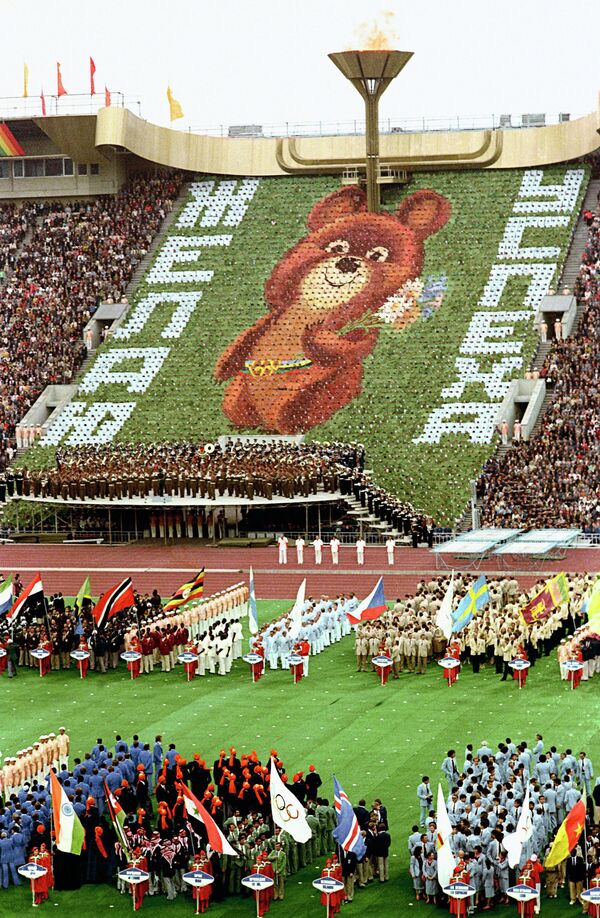The famous promise by Soviet leader Nikita Khrushchev that his people would see Communism in 1980 is usually mocked, but it did come true, though only for a couple of weeks and only for Moscow residents and those visiting for the 1980 Summer Olympic Games, rather than for the entire Soviet Union. Thirty years ago, starting from July 19, to quote the crooner Lev Leshchenko, "We found ourselves in some wonderland, called an Olympic dream that lasted two weeks."
The authorities spared no effort in bringing out the best in Socialism. One could see clean Moscow streets (with all criminally-minded citizens relocated 100 km from the city borders) and polite white-uniformed police officers. Metro announcements in two languages - Russian and English - were music to passengers' ears, while the stomach could rejoice at the sight of Finnish food in the stores and - wonder of wonders - there were no lines.
But all that was only a "dressing" to the main "dish": the ceremonies accompanying the Games. Such as the opening and closing ceremonies (on July 19 and August 3), which experts later described as superb examples of Olympic pageantry.
In 1980, the dream was turned into reality by a team of professional theater experts led by People's Artist of the U.S.S.R. Iosif Tumanov (real name Tumanishvili). By that time he had dozens of productions, concerts and performances under his belt and had even worked with Konstantin Stanislavsky himself.
According to Valentin Alexeyev, assistant stage-manager for the Games, now a member of the Academy of Sciences, the original candidate was the ballet master Igor Moiseyev. But Moiseyev refused when he was told that he could not consult directly with Leonid Brezhnev on organizational and creative matters.
The opening ceremony of the 22nd Olympic Games at the Lenin Stadium was conceived in the spirit of ancient Greece. Some youths dressed in tunics walked carrying amphorae in their arms, others drove chariots drawn by four horses. Girls in tunics showered the Olympeans' path with rose petals.
The supreme moment arrived when a torch carrying the Olympic flame was handed to Sergei Belov, the well-known Soviet basketball player and 1972 Olympic champion, to ignite the flame for the Games. International Olympic Committee members wondered how Belov would do the trick, because the flame bowl was separated from the stadium by grandstands filled with spectators. But as the athlete ran up to it, an improvised lane of snow-white shields unfolded before him. Belov ran up it, as if stepping over the spectators' heads, with the flaming torch raised high above his head, and lit the bowl. The effect was staggering.
Of course, the stage-directors for the following Olympic Games went one better than their Moscow colleagues. In Barcelona, archer Antonio Rebollo lit the Olympic flame by shooting a burning arrow into the bowl. In Sydney, the athlete Cathy Freeman drew a circle on the water with her torch. The liquid ignited and rose in a fiery ring to the huge bowl, where it burnt with renewed force.
But the Moscow event marked a watershed in the history of the world's Olympic movement.
True, it was much earlier that a sports ceremony became an artistic event -- in 1936 in Nazi Germany, where for the first time the flame was delivered from Greece by relay runners and the opening of the Games was, also for the first time, broadcast live on television.
A mass performance differs from the theater and cinema in that it is a one-off event where every participant has to act in strict unison. To quote army leader Alexander Suvorov, "every soldier needs to know his maneuvers." But even the stage director of the performance can do nothing without assistants, sound technicians or camera men responsible for the picture on stadium screens and for the combined efforts of tens and even hundreds of thousands of extras contributing to the overall effect. Tumanov's team worked tirelessly and successfully, but the tremendous effort cost the director his life: he died prematurely the following year, in 1981.
As Belov ran up to the bowl, few suspected that soldiers from Moscow Region units were underneath, holding up the shields. They were also the ones who built live images adding such color to the ceremony. Five thousand servicemen (who had been allowed to wear sports clothes and let their hair grow a bit) were a real find for the organizing committee, who rightly believed that civilians would be hard to work with in an artistic show of these proportions. The military were used to commands and, on orders from director Lev Nemchik, displayed various pictures by means of colored flags, fans and shirtfronts. There were rehearsals day and night.
While the opening ceremony was joyful and pompous, the closing ceremony saw more tears shed than at any other Olympic Games. An atmosphere of sorrow was created not only by the slow dying of the Olympic flame in the bowl, but also by the famous tear which rolled down the muzzle of Misha the Olympic mascot, again helped by those same 5,000 troops. But the saddest moment came when the animal began floating up and away to the strains of a song composed by Alexandra Pakhmutova and lyricist Nikolai Dobronravov.
With Misha gone, Finnish food in the stores, the polite police officers in dress uniforms, foreigners speaking various languages and other surprising personages also departed. For Soviet people the dream ended. In 11 years' time, the Soviet Union ended, too. The Moscow Olympic Games have gone down in history.
MOSCOW (RIA Novosti commentator Sergei Varshavchik)
The opinions expressed in this article are the author's and do not necessarily represent those of RIA Novosti.



